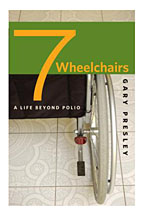 I’m pleased to post this guest essay by the talented Gary Presley, author of Seven Wheelchairs: A Life Beyond Polio:
I’m pleased to post this guest essay by the talented Gary Presley, author of Seven Wheelchairs: A Life Beyond Polio:
I am very much a believer in the idea that writing both creates and destroys, a whimsically ironic perception I contrived long ago after I read “We Are Norsemen,” a short story by the novelist T. Coraghessan Boyle.
Boyle’s narrator is a skald, a Viking poet, and the story chronicles a raid on the Irish coast. At the end of the raid, the skald destroys an illuminated manuscript in the presence of its monk-creator, an irony of the first order since the skald fancies himself an artiste, an intellectual among brutes.
What does writing create, and destroy? For me as an essayist and an author of a memoir, I think I create and destroy truth and illusion. Of course, it is sometimes painful to pull the rug out from under someone’s perceptions. A few readers of my memoir believe I fester with toxic anger. I don’t, if you’re interested. But I don’t care to disguise whatever anger lives in me. The anger is true. But at the moment not toxic.
That sort of writing doesn’t come easy. For one thing, the rug came out from under some of my own perceptions. For another, there’s an element of narcissism that’s less than appealing – too much thinking about who I am and what I want to write, about organizing the raw material, about writing it down, and about discovering what it is.
And narcissism can lie to itself if it is not careful.
And this leads me back to another writer who apparently influenced me before I knew I wanted to write: the black humorist Peter DeVries. Each time I feel as if the world has failed me – “How dare it!” – I remember a line from one of DeVries’ novels. “Human nature is pretty shabby stuff, as you may know from introspection.”
I don’t except myself. We are, every soul alive, flawed creatures. I suppose I am saved from disgrace only because I am thoroughly willing to dirty up my own self-image in trying to confront and explain what I know about the world. I’m even willing to appear “shabby” simply to confront the anxieties and insecurities of being alive, being mortal.
Here’s a thing you may learn while attempting to tell the truth: it is a fearsome thing, this living, this being human on our lost outpost circling somewhere within Infinity, and sometimes it is enough to cramp our guts with a visceral fear so dark that we might rip apart an illuminated manuscript in terror.
My memoir – Seven Wheelchairs: A Life beyond Polio – was in fact an act of creation, an act of affirmation. What I didn’t know when I set out to tell my little story is that I would be required to abrade myself down to the point where elementary emotional qualities reign, to burn away illusions and then dig through the emotional ashes to find some sort of truth that you, the reader, did not know.
Of course, there is irony piled upon irony, for as the poet-prophet who penned Ecclesiastes wrote in his first chapter, “What has been, that will be; what has been done, that will be done. Nothing is new under the sun.”
But like DeVries, I tend to prefer the sardonic, and so I will pair Ecclesiastes with that lost soul, Ambrose Bierce, who surely read the prophets thoroughly enough to agree, and then take it one step further as a writer should, “There is nothing new under the sun but there are lots of old things we don’t know.”
All that’s fine, and I agree. I told no truth that had not been told before. In fact, I could be persuaded there is but One Story, a Truth which is made up of an infinite number of multiple stories. But I destroyed an illuminated manuscript in the process, one decorated with all the figments of my imagined reality.
In fact, I might offer the opinion that unsparing observation, both introspective and external, is the obligation of fiction authors as well, even if a good measure of the human psyche exists in mystery – in illusion – beyond the reach of art.
Gary Presley’s work has appeared in Notre Dame Magazine, the Washington Post, and Salon.com. His memoir was published by The University of Iowa Press, October 2008. Learn more at his website: http://www.garypresley.com

Hi Gary,
Saw on Facebook that you were here today. How long did it take you to write your book, Seven Wheelchairs? And when you started it, did you plan it for publication? Or simply as a personal story for yourself and family?
Thanks
The book only took about 6-12 months to write, but … getting it into shape for submission took another 3 months. Then there was the time to look up agents and contact them; then I went to university and independent presses; and then it was another two years or so through the editing process with them. Agents and editors move slowly because they must devote their time to more than one writer.
Yes, it was planned as a memoir from the start. I wrote an essay about some aspect of using a wheelchair, and several in my online writing group said “You need to write a memoir.”
And so I did.
I really thought a good part of my family wouldn’t like it, and I made no effort to see that they knew it was out there, but so far I’ve had only one negative reaction.
Gary